| Srl | Item |
| 1 |
ID:
122503
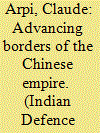

|
|
|
|
|
| Publication |
2013.
|
| Summary/Abstract |
The incidents in the Depsang Plain, near the Karakoram Pass in April or more recently, in Chumar in South Ladakh, are the continuance of Nehru's blind spot for China. There is today a huge difference of 'perception' on the location of the Line of Actual Control which over the years has been moving towards the South and the West. The 1959 LAC was indeed far more advantageous for India than the present LAC.
|
|
|
|
|
|
|
|
|
|
|
|
|
|
|
|
| 2 |
ID:
147383
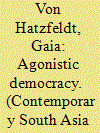

|
|
|
|
|
| Summary/Abstract |
This paper examines the political developments around the Anna Hazare-led anti-corruption movement that escalated in India through most of 2011. Although the overtone of the movement was primarily about corruption, my aim in this paper is to explore the debates regarding democracy that the movement unleashed. The accounts that this paper draws on focus on the tension and competition that arose during the anti-corruption movement amongst two civil society groups – ‘Team Anna’ and the National Campaign for the People’s Right to Information – regarding the meaning and practice of democracy. I argue that this conflict reflects a broader tension deeply rooted in democratic debates in India, traceable to the early nationalist debates during the anti-colonial Independence movement. These findings suggest that conflict and competition are crucial ingredients of democratic debate, contributing to the sustenance and enrichment of the idea of democracy. This argument is particularly timely, for it helps us to understand the rise to power of the Aam Aadmi Party.
|
|
|
|
|
|
|
|
|
|
|
|
|
|
|
|
| 3 |
ID:
025547
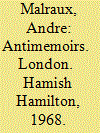

|
|
|
|
|
| Publication |
London, Hamish Hamilton, 1968.
|
| Description |
448p.Hbk
|
| Standard Number |
241015235
|
|
|
|
|
|
|
|
|
|
|
|
Copies: C:1/I:0,R:0,Q:0
Circulation
| Accession# | Call# | Current Location | Status | Policy | Location |
| 001832 | 923.2/MAL 001832 | Main | On Shelf | General | |
|
|
|
|
| 4 |
ID:
191585
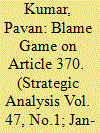

|
|
|
|
|
| Summary/Abstract |
On 5 August 2019, India’s Prime Minister Narendra Modi took a bold decision and made drastic changes to Article 370 of the Indian Constitution, thus changing the legal status of the state of Jammu and Kashmir. This further sparked a debate over the real architect of the Article. There has been a lot of debate and discussion around Article 370. Article 370 provided a special status to the state of Jammu and Kashmir. The debate around Article 370 is highly political, biased, and targeted. It is either blaming Jawaharlal Nehru for the Article or proving that Vallabhbhai Patel was the real architect of the Article.Footnote1 This Essay goes beyond this narrow debate and looks into the available documents for a more authentic picture of the Article and Vallabhbhai Patel’s approach to it. The story of Article 370 follows the following trajectory.
|
|
|
|
|
|
|
|
|
|
|
|
|
|
|
|
| 5 |
ID:
091989
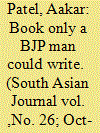

|
|
|
|
|
| Publication |
2009.
|
| Summary/Abstract |
In its first issue of September, India's second biggest magazine Outlook carried two pages of letters on Jaswant Singh's new book. Amir Rasheed wrote from New York: As a kid growing up in Patna, even as a Muslim, we always had the ipression that it was Jinnah who wanted Partition. Now we can see the whole game was more complex. Jinnah wanted an equitable share of power for India's Muslima, not a partitioned one in a divided Punjab and Bengal.
|
|
|
|
|
|
|
|
|
|
|
|
|
|
|
|
| 6 |
ID:
038695
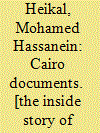

|
|
|
|
|
| Publication |
New York, Doubleday and company, 1973.
|
| Description |
xxxv, 360p.Hbk
|
| Standard Number |
0385064470
|
|
|
|
|
|
|
|
|
|
|
|
Copies: C:1/I:0,R:0,Q:0
Circulation
| Accession# | Call# | Current Location | Status | Policy | Location |
| 012229 | 923.162/HEI 012229 | Main | On Shelf | General | |
|
|
|
|
| 7 |
ID:
125237
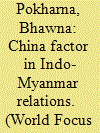

|
|
|
|
|
| Publication |
2013.
|
| Summary/Abstract |
Myanmar has two great and powerful neighbours, India to the Northwest and China to the Northeast. It has Bangladesh to the West, Laos to the East and Thailand to South East. Myanmar's long coastline with good harbors enables it to dominate the Bay of Bengal. Myanmar Shares 2171 kilometres Long border with China whereas with India it shares 1643 kilometres of border. Myanmar lies where South, South East and Asia meet - there the dominant cultures of these sub-regions compete for influence.
|
|
|
|
|
|
|
|
|
|
|
|
|
|
|
|
| 8 |
ID:
118145


|
|
|
| 9 |
ID:
122079
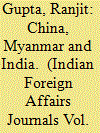

|
|
|
| 10 |
ID:
187203
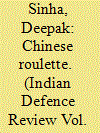

|
|
|
| 11 |
ID:
028774
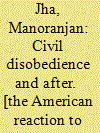

|
|
|
|
|
| Publication |
Meerut, Meenakshi Prakashan, 1973.
|
| Description |
xi, 300p.: bib.hbk
|
|
|
|
|
|
|
|
|
|
|
|
Copies: C:1/I:0,R:0,Q:0
Circulation
| Accession# | Call# | Current Location | Status | Policy | Location |
| 012185 | 954.03/JHA 012185 | Main | On Shelf | General | |
|
|
|
|
| 12 |
ID:
118875


|
|
|
| 13 |
ID:
079532
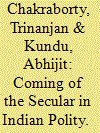

|
|
|
|
|
| Publication |
2007.
|
| Summary/Abstract |
Instead of searching for a definitive connotation of what is 'secular', the present essay explores how secular concepts gradually arrived on the scene of the Indian polity from a variety of areas and re-examines possibilities of probing the place of the secular in Indian polity by problematising its practice over time. Our methodology involves a shift of focus in searching for the roots of this concept in local and peripheral arenas rather than central texts and events. The dynamics of Indian centre-periphery relations have been dominantly historicised by the struggle for independence. This essay highlights the relevance of peripheral texts in defining secular aspects of polity, examining the dominant texts of the centre from the vantage point of the margin. While documenting an alternative discursive construction of secular politics in India, a sociologically informed reading on the question of 'the secular' argues that it will never dominate Indian politics without multiple challenges
|
|
|
|
|
|
|
|
|
|
|
|
|
|
|
|
| 14 |
ID:
157085
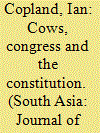

|
|
|
|
|
| Summary/Abstract |
Added late to the draft Indian Constitution, Article 48 specifically mandated the Indian state to criminalise the killing of cows, a provision that, as well as being arguably at odds with at least three of the document's Directive Principles, was implicitly anti-Muslim. The provision was adopted, almost without demur, by a Constituent Assembly dominated by the Congress at a time when discrimination against the Indian Muslim minority in other fields was rife. With hindsight, the making of Article 48 can be seen as the first victory in post-colonial India of the nascent Hindu Right, preceding as it did even the formation of the country's first effective Hindu political party, the Bharatiya Jana Sangh. This paper investigates how, and why, the cause of cow protection came to be supported (and effectively sponsored) in the Assembly by senior members of a supposedly secular Congress parliamentary caucus headed by staunch anti-communalist, agnostic and Muslim sympathiser, Prime Minister Jawaharlal Nehru.
|
|
|
|
|
|
|
|
|
|
|
|
|
|
|
|
| 15 |
ID:
068427


|
|
|
|
|
| Publication |
New Delhi, India Research Press, 2006.
|
| Description |
xvi, 816p.hbk
|
| Standard Number |
8187943572
|
|
|
|
|
|
|
|
|
|
|
|
Copies: C:1/I:0,R:0,Q:0
Circulation
| Accession# | Call# | Current Location | Status | Policy | Location |
| 051033 | 954.0358092/CHA 051033 | Main | On Shelf | General | |
|
|
|
|
| 16 |
ID:
107894
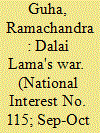

|
|
|
| 17 |
ID:
117127
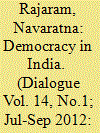

|
|
|
| 18 |
ID:
118870
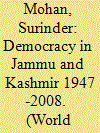

|
|
|
| 19 |
ID:
131777
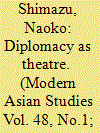

|
|
|
|
|
| Publication |
2014.
|
| Summary/Abstract |
As a significant 'moment' in twentieth-century international diplomacy, the rise of post-colonial Afro-Asia at the Bandung Conference of 1955 is replete with symbolic meanings. This paper proposes a conceptual approach to understanding the symbolic dimension of international diplomacy, and does so by ruminating on the newly unearthed Indonesian material on the Bandung Conference. To this end, 'diplomacy as theatre' is introduced as an interpretive framework to re-cast the conference as a theatrical performance, in which actors performed on the stage to audiences. Focusing on the city of Bandung, this paper reconstructs some examples of the 'performative' dimensions of international diplomacy, and elaborates on the notion of 'staging' the city and the role played by the people of Bandung, including the significance of conference venues, as well as the impromptu creation of a ritual citation that contributed to an iconic 'performative act' during the conference. Sukarno, Nehru, Zhou Enlai and Nasser all understood the importance as performers in their role as new international statesmen, representing the esprit de corps of the newly emergent post-colonial world. In deconstructing the symbolic, it will become evident that the role played by Indonesia significantly influenced the underlying script of the diplomatic theatre which unfolded at Bandung.
|
|
|
|
|
|
|
|
|
|
|
|
|
|
|
|
| 20 |
ID:
119974


|
|
|